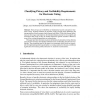Free Online Productivity Tools
i2Speak
i2Symbol
i2OCR
iTex2Img
iWeb2Print
iWeb2Shot
i2Type
iPdf2Split
iPdf2Merge
i2Bopomofo
i2Arabic
i2Style
i2Image
i2PDF
iLatex2Rtf
Sci2ools
77
Voted
GI
2009
Springer
2009
Springer
Classifying Privacy and Verifiability Requirements for Electronic Voting
Abstract: Voter privacy and verifiability are fundamental security concepts for electronic voting. Existing literature on electronic voting provides many definitions and interpretations of these concepts, both informal and formal. While the informal definitions are often vague and imprecise, the formal definitions tend to be very complex and restricted in their scope as they are usually tailored for specific scenarios. Moreover, some of the existing interpretations are contradictory. This paper provides informal, yet precise definitions of anonymity, receipt-freeness and coercion-resistance and identifies different levels of individual and universal verifiability. The overarching goal of this paper is to investigate which levels are conceivable for implementing these requirements in e-voting systems for elections of different significance (for instance political elections vs. elections in associations).
Electronic Voting | Fundamental Security Concepts | GI 2009 | Informal Definitions | Theoretical Computer Science |
Related Content
| Added | 16 Aug 2010 |
| Updated | 16 Aug 2010 |
| Type | Conference |
| Year | 2009 |
| Where | GI |
| Authors | Lucie Langer, Axel Schmidt, Melanie Volkamer, Johannes Buchmann |
Comments (0)

